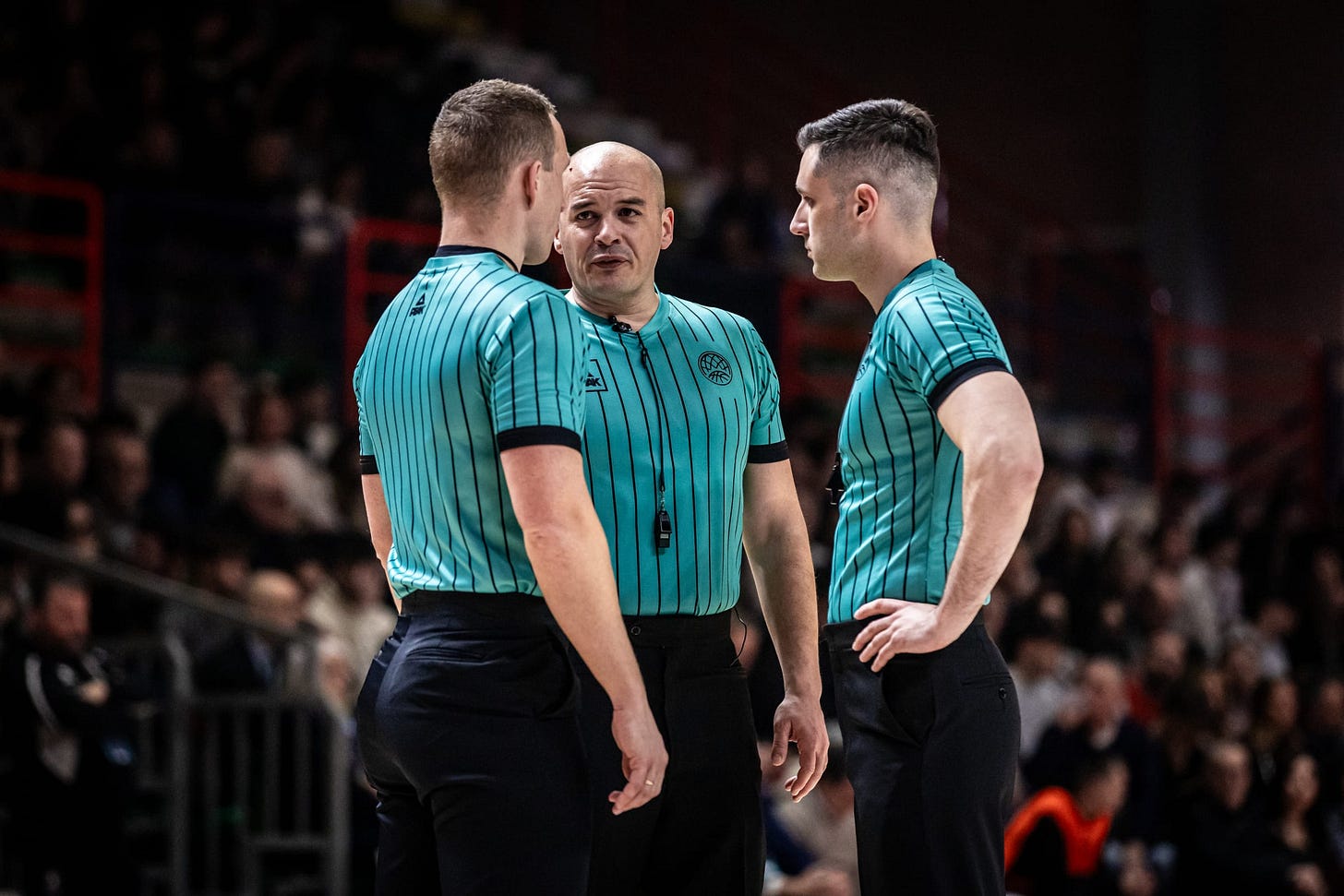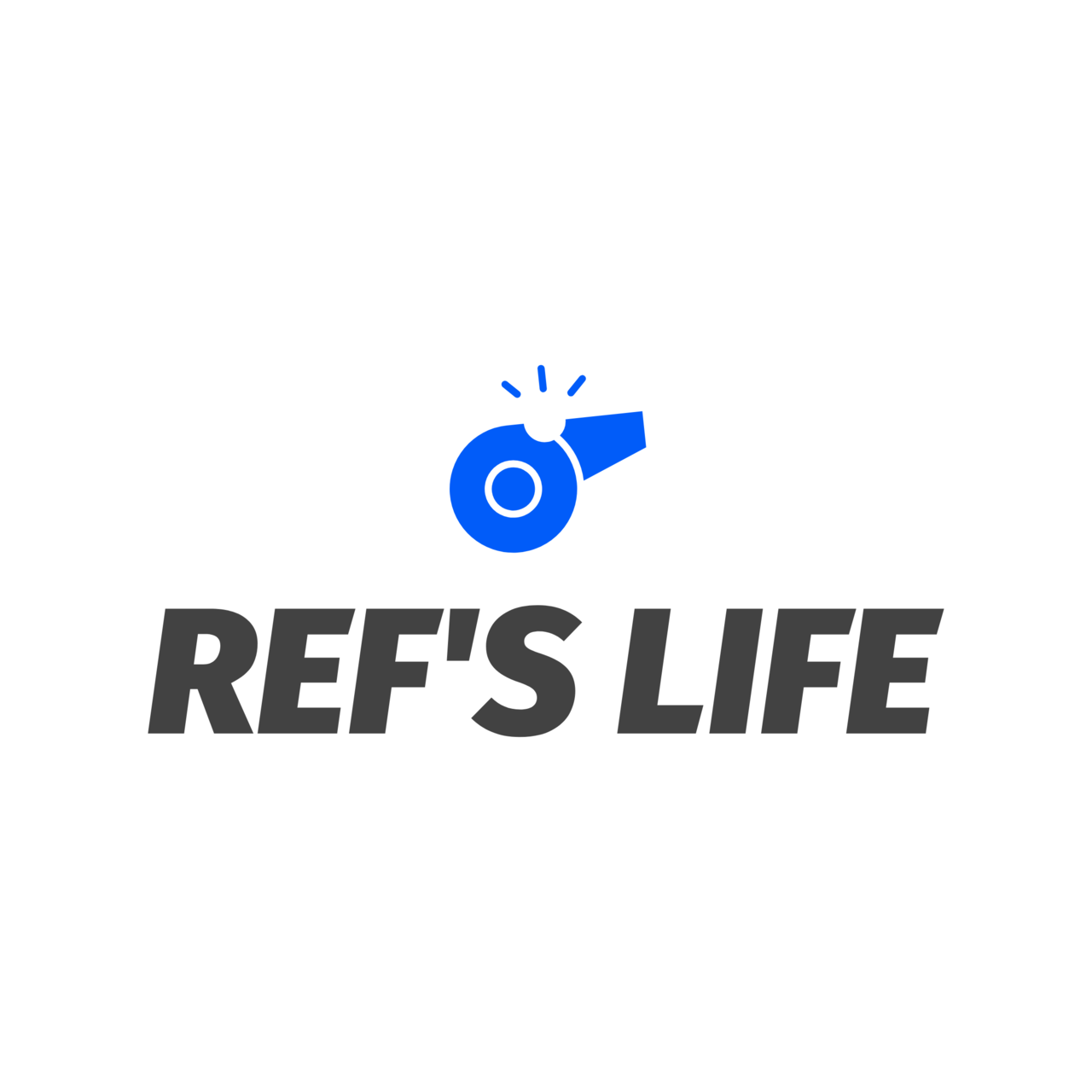The Psychology of Officiating - Part 1: Emotional Control
Officiating is as much a mental game as it is a physical one
If there’s one thing I’ve learned about officiating, it’s this: the toughest battles aren’t fought on the court—they’re fought in your own head.
A while back, we talked about how the external pressures of officiating can feel overwhelming. We discussed the weight of every whistle, the microscopic examination of every call, and how the demand for perfection feels like walking on a tightrope with no safety net below. The pressure of fans, the players’ emotional reactions, the coach pacing the sideline—all of it adds up. And there’s no doubt, those pressures are real. But what I’ve come to realize over the years is that the external noise is only part of the challenge.
The real test is learning how to quiet the internal noise—the doubts, the frustrations, the emotions that can cloud your judgment if you’re not careful.
These moments of pressure, when the world feels like it’s closing in on you, are inevitable. Every referee, no matter how experienced, has been there. A tough call that changes the momentum, a mistake you can’t stop replaying in your head, the second-guessing that creeps in when the stakes are high. The question isn’t whether these moments will come or not—because they will. The question is: how do you handle them? How do you stay composed and focused when everything feels like it’s on the line?
That’s what this article—and the next few in this series—are all about.
We’re going to explore emotional control not as an abstract concept, but as a skill you can build, refine, and rely on. I’ll share the strategies I’ve found useful, the lessons I’ve learned through experience, and the things I wish someone had told me earlier in my officiating journey. I know what it’s like to feel the weight of the whistle, and I’ve seen how mastering the mental side of officiating can make all the difference.
And this is just the beginning.
Over the next few weeks, we’ll go deeper. We’ll talk about how to mentally prepare for a game, how to bounce back when mistakes happen, and how to build the kind of resilience that lasts not just for a game, but for an entire career. My hope is that, this series will arm you with the mental tools to navigate the pressures of officiating at the elite level.
Here we go!
Complimentary read:
The Invisible Challenge
For basketball referees, emotional control is not just about staying calm; it’s about staying present in the face of overwhelming pressure. It’s about making the right call in an arena full of crowd, with millions watching, knowing that one mistake could tilt the game’s balance. At this level, emotional resilience isn’t a luxury—it’s a necessity.
But how do you develop that resilience? How do you stay focused in the storm? It’s not something you practice with a whistle and a rulebook—it requires introspection, preparation, and a deep understanding of the psychological forces at play.
The Weight of the Whistle
Every referee has felt it—that moment when the game slows down, and all eyes turn to you. Maybe it’s a borderline foul call late in the fourth quarter, or a decision to silence an irate coach with a technical. These are not just decisions; they are emotional crossroads. And they reveal a truth that every referee knows but rarely discusses:
Officiating is as much a mental game as it is a physical one.
The pressure isn’t just external. It’s internal, too. The fear of making a mistake, of letting your crew down, or of being remembered for all the wrong reasons can creep into your mind if you’re not careful. And once it’s there, it grows, clouding your judgment and pulling you out of the moment.
This is especially true during big tournaments or play-offs. The magnitude of the event amplifies everything—the noise, the stakes, the emotions. A slip of focus isn’t just costly—it’s monumental. That’s why the best referees in the world don’t just train their bodies; they train their minds.
Understanding Emotional Triggers
The first step in mastering emotional control is understanding what triggers you. For some, it’s an aggressive player who just won’t let up after a close call. For others, it’s the roar of the crowd after a controversial whistle. Sometimes, it’s the haunting memory of a mistake you made two quarters ago that you can’t seem to shake.
Take a moment to reflect: when was the last time you felt truly tested as a referee? Was it the angry coach pacing the sideline? The players protesting you after a tough foul call? Or was it your own inner voice, doubting your decision?
These triggers are universal, but the way we respond to them isn’t. Some referees freeze. Others overcompensate. The key is to acknowledge the emotions without letting them dictate your actions. You can’t always control the external chaos, but you can control your internal response. The key to mastering these moments lies in staying grounded in the here and now—what I like to call the art of staying present.
The Art of Staying Present
One of the most valuable lessons I ever learned as a referee came from an experienced official who, after decades in the job, had seen it all. His advice was disarmingly simple: “Stay where your feet are.”
At first, this didn’t make sense to me. But over time, I realized he was talking about presence—something that’s easy to lose when emotions run high. Staying present means focusing on the moment you’re in, not the one that just passed or the one that’s about to come. It means grounding yourself in the play unfolding before you, not the repercussions of your next decision.
Presence, however, doesn’t just happen. It requires deliberate effort. For some referees, it starts before the game even begins. They visualize potential scenarios—a heated argument with a coach, an emotional overtime period—and rehearse how they’ll handle them. By the time those moments arrive, they’re ready, not reactive.
During the game, presence is about resetting. After a tough call, take a deep breath. Feel your whistle in your hand, your shoes on the ground. These small, physical actions can anchor you in the here and now, helping you move on from the call that’s already behind you. Of course, staying present doesn't mean you won’t make mistakes—it means having the resilience to deal with them when they happen.
A Game of Mistakes
Let’s be honest: no referee officiates a perfect game. Mistakes happen. It’s what you do after them that defines you.
The temptation, of course, is to overstay on it. To replay the moment in your mind, dissecting every angle, wishing you could go back. But the game doesn’t stop to let you catch up. If you’re stuck in the past, you’ll miss what’s happening in the present—and that’s when the real problems start.
The best referees have a short memory. They learn from their mistakes, but they don’t let them linger. They understand that the next call is more important than the last one. This mindset isn’t about ignoring errors; it’s about putting them in their proper place—behind you! But as much as emotional resilience starts within, it doesn’t have to be a solo effort.
The Role of the Crew
There’s a reason referees work in teams. Your crew is more than just a group of colleagues—they’re your support system. In high-pressure moments, they can be the steadying presence you need to stay calm.
But this requires trust, and trust doesn’t happen by accident. It’s built through communication, both on and off the court. During the game, your crew should be a source of clarity, not confusion. A quick eye contact, a reassuring nod, or a brief discussion during a timeout can make all the difference in keeping emotions in check.
Off the court, debriefing with your crew is just as important. After the game, talk about the moments that tested you. Share how you felt and what you could have handled differently. These conversations aren’t just about improving your performance—they’re about strengthening the bond between you and your teammates.
Final Thoughts: The Invisible Victory
Emotional control isn’t something you master overnight. It’s a skill that requires constant practice and self-awareness. But for referees at the highest levels, it's what separates the good from the great and the great from the elite.
The irony of emotional control is that, when done well, it’s invisible. No one will see the deep breath you take before a big call or the mental reset you perform after a tough moment. They’ll only see the result: a referee who is calm, composed, and in command.
And isn’t that the ultimate goal? To officiate not just with precision, but with poise. To manage not just the game, but yourself. To walk off the court knowing that, no matter how chaotic the game became, you stayed where your feet were.







